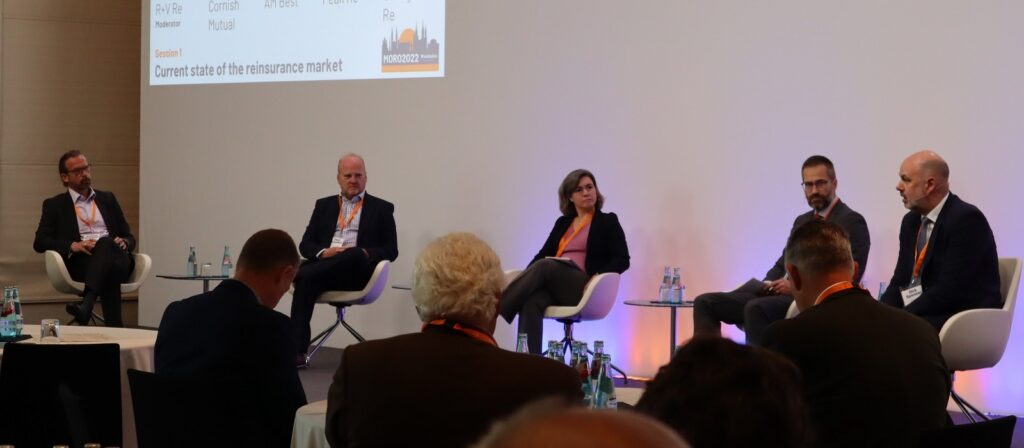The impact of the pandemic on renewal discussions and networking
The panel discussed the cancellation of the Monte Carlo and Baden Baden reinsurance conferences in 2020, and Monte Carlo again in 2021. Missing the conference itself was not an issue, but more missing the human interaction: the chance to bump into people and have interesting, unexpected discussions. These conferences are not completely necessary, but it is important to have a platform where everyone can meet in one place. The industry has adapted well to a virtual environment but miss being in the same room; in-person meetings are most valuable for building relationships.
In the future, people will be likely to be more selective about attending conferences and more deliberate about managing travel schedules. For a reinsurer, instead of visiting a country three times-a-year, some of this might now be hybrid, with more informal, short virtual meetings. Travel will still happen, but not as much as before.
An example was given of taking a renewal presentation, which normally takes up most of a face-to-face renewal meeting, then recording it as a video to be shared with reinsurers in advance of renewal discussions. The reinsurer then has the flexibility to watch the video at their convenience and may be better prepared for the renewal meeting, leading to a two-way dialogue with richer discussion instead of simply repeating the same things. This is something that will probably be made permanent as it allows for richer collaboration with reinsurers.
The impact of remote working on people and performance
People have learned to work in a different way. As there is a move back towards meeting face-to-face, we need to take advantage of what we have learned about the positive aspects of remote working. Mental health needs to be considered, as people are working hard to adapt under completely different circumstances and with even more expectation placed on them. Onboarding has been a challenge, with the difficulty of learning on the job when we are not in the same location.
On the positive side, through working virtually other (more junior) colleagues have been invited to attended client meetings: something that they would not have been able to attend if it were face-to-face, and in many cases, has accelerated their development. There has been a mix of positives and negatives: we may not find out what real expense in human terms is for some years.
The impact of the pandemic on claims and coverage
Regarding claims arising from the pandemic, there is still a lot of uncertainty. The initial estimates were very diverse and there is still a lot outstanding/incurred but not reported (IBNR). Reserving is difficult, particularly for business interruption. There has not been as much claim activity in Asia, but with some countries experiencing second waves this is still an ongoing event. The 2020 Olympic Games in Japan remain a big concern. COVID-19 has highlighted that primary insurers need to be very clear with the intent and wording of their policies and that the client is aware of what they are covered for. The biggest learning from the pandemic is that reinsurers need to be more transparent with clients. They need to identify the other pockets and those gaps in expectations of what is covered and how to pro-actively bridge those gaps.
Systemic risk
Reinsurance depends on diversification: but how do you deal with systemic risks that cannot be diversified?
Pandemic is a modelled risk, but we did not know and cannot model the political reactions to it (such as nationwide lockdowns). Insurers and reinsurers are reacting by putting in exclusions against pandemic. There is similar potential for global losses in cyber, with silent cyber being excluded. This presents the challenge of communicating exclusions to clients, so they better understand what is covered. The market is well capitalised for what it was expected to cover, but not to cover all the business interruption that was not expected. The challenge is that you need to quantify global systemic risks to be able to price them; but if the industry is moving towards exclusions, then the customer must either rely on the state or just let it play out.
In Canada, talks were going on even before the pandemic, for example regarding earthquake risks, about creating a “backstop” to help society rebuild. There are constraints on what the reinsurance industry can handle: for example, the Canadian government has spent over CAD 300 billion on pandemic relief, whereas total insurance capital in Canada is CAD 60 billion. Some risks are outside what the industry can support, so there needs to be continuing engagement with public officials as systemic risks such as cyber and communicable disease are increasing.
Differential terms
2020 has shown that as soon as differential terms are introduced, then this invites everyone to come up with their own terms. Insurers will not benefit from differential pricing over the long term.
Differential could be on terms as well, as in 2021 an enormous amount of time has been spent discussing exclusions as different reinsurers may have different preferred exclusions for cyber or for pandemic. Administration is more complex for differential terms, there is a place for it, but it does not suit every client or every circumstance. Offering differential terms may be seen as opportunistic, which will have a downside for long-term relationships.
From a ceding company perspective, differential terms are very difficult when you have a diverse panel and want to treat them fairly. Terms and conditions cause a lot of challenges. Wording must be consistent otherwise it can create a gap between primary cover and reinsurance cover. Buyers want to treat partners fairly with consistent terms.
Reinsurance panel and sustainability
At The Co-operators in Canada, a lot of consideration goes into selecting the reinsurance panel. It focuses on elements of ESG and sustainability as part of its approach, which is a strategic priority for the organisation. In addition to traditional metrics that are used to select reinsurance partners, the cooperative insurer also asks about sustainability efforts and initiatives. If reinsurers are thinking about sustainability, then this helps to move society towards a more sustainable position; in turn, extending to financial sustainability.
Are we in a hard market?
It is a hardening, but not a hard market. There have been some price improvements since 2018, which have gathered pace in the last few years. These are not particularly big improvements but across the board and sustained; and not just prices, but also terms and conditions.
Premium rates have also increased in the primary markets, which has a gearing effect for reinsurers. It cannot be classed as a hard market because there is still plenty of capacity, but it is a market that is being driven by insurers and reinsurers’ need to improve performance metrics after several years of substantial losses and soft conditions. A combination of the low interest rate environment, COVID losses, and poor combined ratios means that there is a need to refocus efforts on improving underwriting results.
Session panellists:
- Apundeep Lamba, Vice-President, Corporate Actuarial & Reinsurance Services, The Co-operators (Canada)
- Mathilde Jakobsen, Director, Analytics, AM Best (Netherlands)
- Glen Riddell, CEO – Asia, Berkley Re (Singapore)
- Maya Popovic-Biereth, Regional Director EMEA N/E, Willis Re (UK)
- Christoph Lamby, CEO, R+V Re (Germany) moderator





